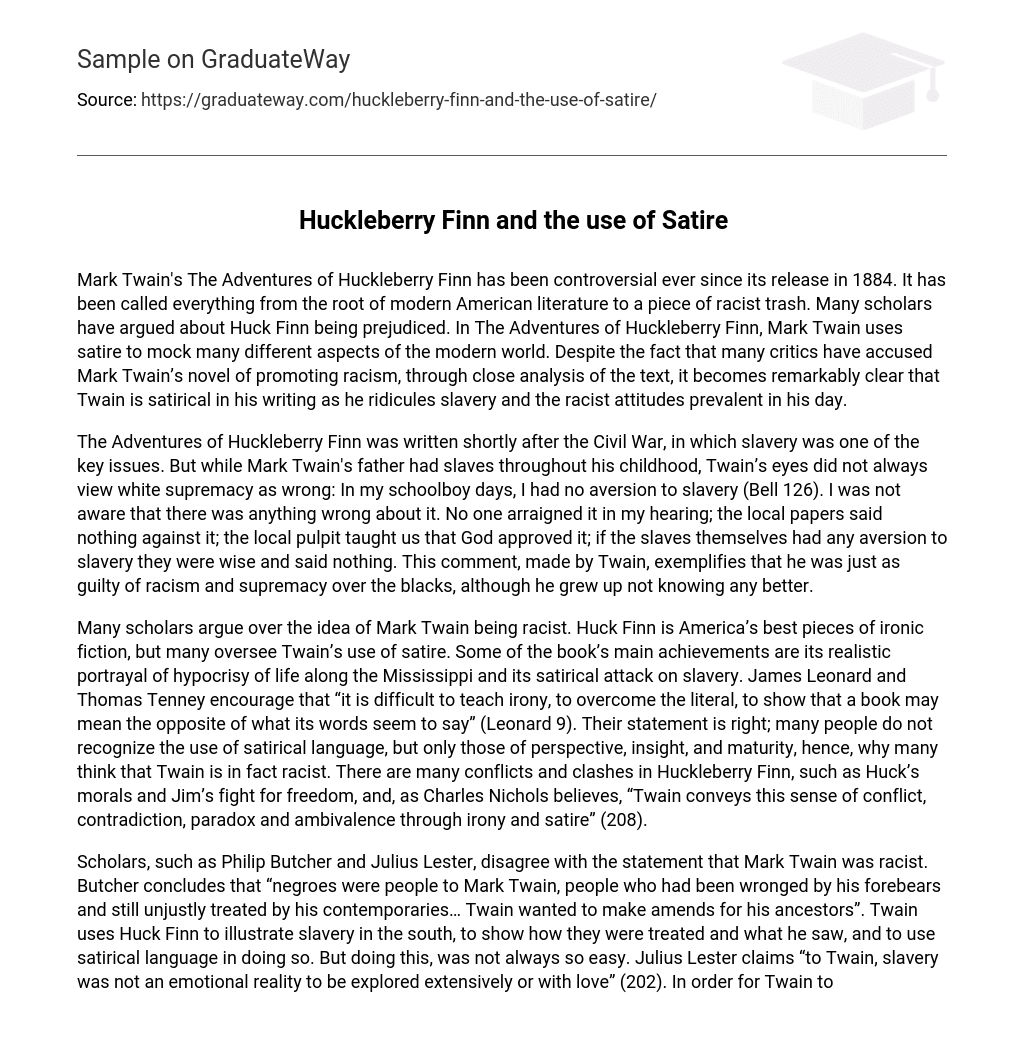Mark Twain’s novel, The Adventures of Huckleberry Finn, has sparked controversy since its publication in 1884. It has been labeled both the foundation of modern American literature and a work of racist value. Numerous scholars have debated whether Huck Finn exhibits prejudice. However, through careful examination of the text, it becomes evident that Twain employs satire to ridicule various aspects of contemporary society. Despite criticism accusing Twain of promoting racism, his writing distinctly satirizes slavery and the prevailing racist beliefs of his time.
Mark Twain wrote The Adventures of Huckleberry Finn after the Civil War, a period marked by the prominent issue of slavery. Despite growing up in a household with slaves, Twain was initially unaware of the wrongness of white supremacy. He confesses, “In my schoolboy days, I had no aversion to slavery…I was not aware that there was anything wrong about it” (Bell 126). Twain explains that no one in his community opposed slavery and even the church preached its approval by God. This quote from Twain emphasizes his own racism and belief in superiority over black individuals, despite his limited understanding at that time.
There is ongoing debate among scholars regarding whether or not Mark Twain was racist. Huck Finn is considered one of America’s greatest pieces of ironic fiction, although many fail to recognize Twain’s use of satire. The book successfully depicts the hypocrisy of life along the Mississippi and satirically criticizes slavery. According to James Leonard and Thomas Tenney, teaching irony can be challenging as it requires moving beyond literal interpretations and understanding that a book may say the opposite of what its words suggest (Leonard 9). This is why many people mistakenly perceive Twain as racist, as they only see the perspective, insight, and maturity shown in the novel. Huckleberry Finn contains numerous conflicts and clashes, such as the moral dilemmas faced by Huck and Jim’s quest for freedom. Charles Nichols argues that Twain effectively conveys this sense of conflict, contradiction, paradox, and ambivalence through the use of irony and satire (208).
Scholars such as Philip Butcher and Julius Lester offer differing perspectives on whether Mark Twain was racist. Butcher argues that to Twain, African Americans were seen as people who had been mistreated by his ancestors and continued to experience unjust treatment during his time. According to Butcher, Twain sought to rectify these injustices. In his work, Huck Finn, Twain aimed to depict the harsh realities of slavery in the southern United States and provide satirical commentary through his language choices. However, Lester disagrees with Butcher’s assessment. Lester asserts that Twain did not approach slavery as an emotional subject to be extensively explored or portrayed with affection. Instead, Twain utilized a story based on ‘true’ events from the post-Reconstruction era, including the use of racially derogatory language like ‘nigger’, to highlight the racism and animosity prevalent at the time (202).
However, there is a contrasting viewpoint among scholars who argue that Twain’s writings contain racist undertones. One such scholar is John H. Wallace, who strongly asserts that “The Adventures of Huckleberry Finn is the most grotesque example of racist trash ever written” (16). Despite my strong disagreement, Wallace believes that Twain’s primary intention in writing Huck Finn is “to ridicule blacks” (23). Due to Twain’s perpetuation of racial stereotypes and his use of offensive language such as “nigger,” many individuals recommend that this book should be banned from schools. This stance has generated heated criticism from those opposing the inclusion of Huck Finn in educational curricula (Henry 32).
However, banning this book is unwarranted as Mark Twain, a highly reputable author, should not be discredited. In an essay on minstrelsy, Bernard Bell asserts that Twain found cultural enjoyment in it. Twain himself remarks, “To my mind [minstrelsy] was a thoroughly delightful thing, and a most competent laughter-compeller and I am sorry it is gone” (128). This statement suggests that Twain did find certain aspects of racism enjoyable. Nevertheless, it is worth noting that Twain is a credible individual who presents a balanced perspective rather than exhibiting bias.
Twain employs satire in various ways throughout the book, including in the headnote. In the headnote, Twain bluntly states that those looking for a motive will be prosecuted, those searching for a moral will be banished, and those seeking a plot will be shot. This statement serves to inform readers that The Adventures of Huckleberry Finn is devoid of morals, plot, and motive. It is a bold and satirical declaration, highlighting Twain’s intention to create a book without conventional moral lessons.
Twain uses the character of Jim to satirize slavery and expose the hypocrisy of slave owners who claim to have strong values. Despite being portrayed as a devout Christian, Miss Watson owns slaves, including Jim who runs away upon hearing about his potential sale. Twain employs satire in Chapter 40 when Huck believes Jim is morally superior because he is “white inside,” ridiculing this notion. However, due to his race, Jim will always face discrimination and be denied the same level of respect as a white person.
In The Adventures of Huckleberry Finn, Mark Twain employs satire to convey his viewpoints on several contentious topics prevalent in the nation during that era, such as slavery and human nature.
Works Cited
Bell, Bernard W. “Twain’s “Nigger” Jim.” Satire or Evasion? Black Perspectives on Huckleberry Finn. Ed. James S. Leonard, Thomas S. Tenney and Thadious M. Davis. Durham and London: Duke University Press, 1992. 124-140. Print.
Henry, Peaches. “The Struggle for Tolerance.” 25-47. Leonard, Tenney and Davis 1992.
Leonard, James S. and Tenney, Thomas A. “Introduction.” 1-11.Leonard, Tenney and Davis 1992.
Lester, Julius.“Morality and Adventures of Huckleberry Finn.”199-207.Leonard,TenneyandDavis1992.
Nichols, Charles.“A True Book-With Some Stretchers.”208-215.Leonard,TenneyandDavis1992.
Wallace, John H.“The Case Against Huck Finn.”16-24.Leonard,TenneyandDavis1992.
Woodard,FredrickandMacCann ,Donnarae.“Minstrel Shackles and Nineteenth-Century ‘Liberality’ .”141-153.Leonard,TenneyandDavis1992.





